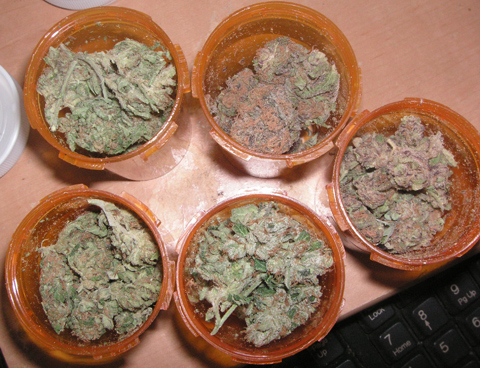
THE PRODUCT Distributing medical marijuana has become an increasingly vexing political problem. |
The medical marijuana movement has always had to be nimble.
Pot, after all, is illegal under federal law. And expanding its reach has required a gentle bit of push and pull — a constant test of what the White House and the Department of Justice will abide.
Activists sensed an opportunity to push further than ever when the Obama Administration issued a memo in October 2009 suggesting US Attorneys shouldn't prosecute those acting in "clear and unambiguous compliance" with state-level medical marijuana laws.
But the proliferation of pot dispensaries in the months that followed — and plans to add more in places like Rhode Island — spooked the Obama Administration. And in the spring, US Attorneys here and across the country sent letters to governors and lawmakers warning that they would shut down the state-sanctioned distributors.
Activists urged governors to call the Obama Administration's bluff — daring federal prosecutors to crack down on medical marijuana, which enjoys considerable public support, with an election on the horizon.
Several, including New Jersey's Republican Governor Chris Christie, heeded the call. But Rhode Island's independent Governor Lincoln Chafee announced in late September that, with the threat of raids hanging over the program, he was blocking three long-planned dispensaries, or "compassion centers."
The move was panned by local pot activists. But in recent months, advocates accustomed to reinvention have turned their attention to yet another overhaul, this one trickier than any they have taken on to date: reshaping Rhode Island's medical marijuana regime for a new and deeply uncertain legal-political landscape.
Progress has been slow, frustrating. But in recent days, the outlines of Medical Marijuana 2.0 have finally begun to take shape.
THE THRESHOLD
The reboot kicked off, in earnest, on January 9 when Senate President M. Teresa Paiva Weed and state Senator Rhoda Perry, a prime architect of the state's medical marijuana law, met with Governor Chafee to sketch out a new direction.
That it has taken this long to get moving is a source of no small irritation for advocates and their allies in the General Assembly.
The governor signaled, when he put the kibosh on the full-bore compassion centers over three months ago, that he would support a scaled-down version of the dispensaries in a bid to avoid federal prosecution. But efforts to draw out the administration on what, precisely, it would accept went nowhere.
Chafee, in the meantime, was working with Washington Governor Christine Gregoire, a Democrat, on petitioning the federal government to reclassify marijuana — currently listed as a Schedule 1 drug alongside heroin — and acknowledge its medicinal properties.
Local activists applauded the late-November petition, but saw it as a long-term effort with little bearing on the present crisis; previous petitions took the federal government years to consider and were eventually denied.
With the local push stalled, the national enforcement picture — in the Obama Administration's new, supposedly more vigilant phase — was anything but clear.
Starting in September, federal authorities in California sent threatening letters to more than 100 dispensaries or their landlords and conducted several raids; the IRS even leveled tax charges against the state's largest dispensary. And in November, agents descended on a string of dispensaries in western Washington state.